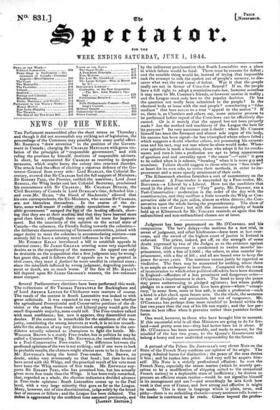NEWS OF THE WEEK.
THE Parliament reassembled after the short recess on Thursday ; and though it did not accomplish any striking act of legislation, the proceedings of the Commons may possibly have some useful effect. Mr. ROEBUCK "drew attention" to the position of the Govern- ment in Canada ; charging Sir CHARLES METCALFE with gross vio- lation of the principles of "responsible government," and with ruling the province by himself, destitute of responsible advisers. In short, he represented Sir CHARLES as resorting to despotic measures, which might hurry the colony into renewed disorder. The attack had the effect of eliciting a vigorous defence of the Go- vernor-General from every side: Lord STANLEY, the Colonial Se- cretary, avowed that Sir CHARLES had the full support of Ministers; Sir Rom= PEEL, the Premier, ratified the assertion; Lord JOHN RUSSELL, the Whig leader and last Colonial Secretary, proclaimed his concurrence with Sir CHARLES ; Mr. CHARLES BuLLER, the Civil Secretary of Canada in Lord DURHAM'S time, defended him ; and even Mr. Beres, " the friend of' Mackenzie," allowed that his own correspondents, the Ex-Ministers, who accuse Sir CHARLES, are not blameless themselves. In the course of the de- bate, some well-meant if rather crude speculations on " respon- sible government " escaped the lips of the leading officials, show- ing that they are at their studies, and that they have learned more good than harm ; although there may still be room for improve- ment. But the unanimity of the opinion on the actual state of -Canada—the calmness, the friendly feeling towards the colonists— the deliberate discountenancing of fantastic extremities, joined with eager desire to meet the colonists in accommodating matters—can scarcely fail to have a salutary moral influence in the province.
Mr. Firzsor KELLY introduced a bill to establish appeals in criminal cases ; Sir JAMES GRAHAM uttering some very superficial doubts as to the expediency of the measure. An appeal can only be desirable on the supposition that a first judgment may be wrong : but grant this, and it follows that if appeals are to be granted in civil cases, they must a fortiori be more needful in criminal cases ; since the mischiefs inflicted by wrong judgment, degrading punish- ment or death, are so much worse. If the fate of Mr. KELLY'S bill depend upon Sir JAMES GRAHAM'S reasons, the law-reformer must conquer.


























